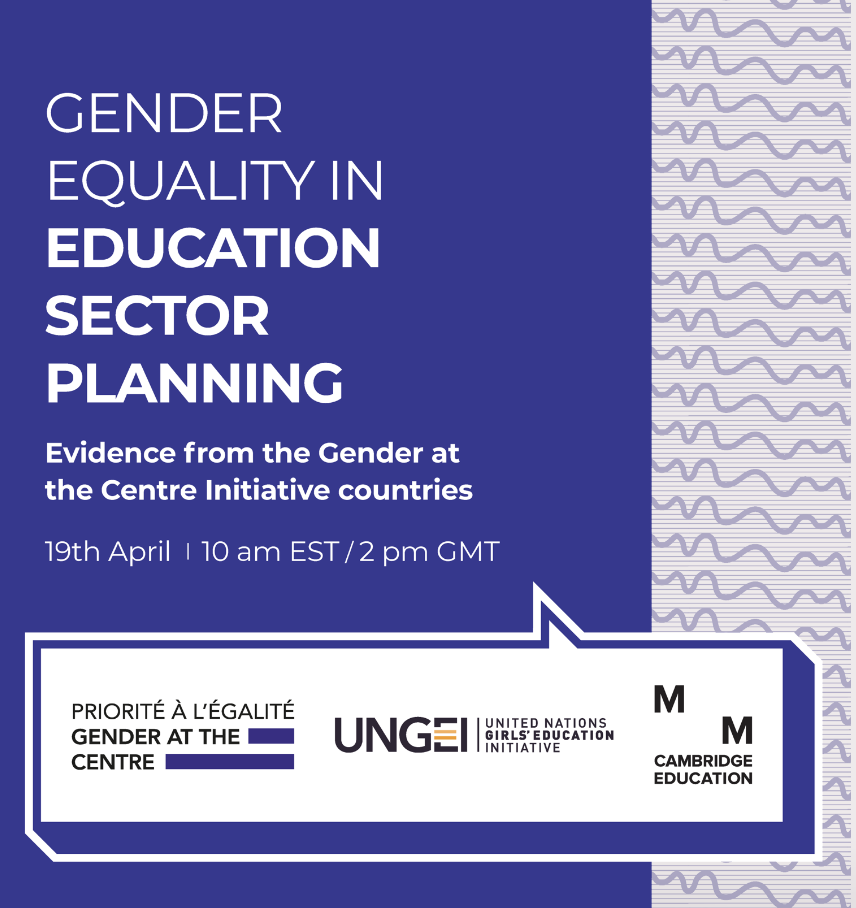In the Sahel region, particularly in Mali and Niger, a new generation of young feminist leaders is driving gender transformative change in education. Supported by the Gender at the Centre Initiative (GCI), coordinated by UNGEI and UNESCO-IIEP, and funded among others by the German Federal Ministry for Economic Cooperation and Development (BMZ), these young activists are not just participants — they are pioneers who play a crucial role in planning and implementing inclusive education policies.

Why a Feminist Youth Coalition?
The Gender at the Centre Initiative (GCI) aims at advancing gender equality in and through education by strengthening education systems, as well as supporting local gender champions. Since 2020 GCI has built a dynamic movement for Gender-Transformative Education across Africa, including Ministries of Education, civil society, technical partners and young feminists. Intergenerational partnership is at the heart of UNGEI’s mission to enhance inclusive dialogue on gender equality in education. That’s why GCI has started supporting the Feminist Youth Coalitions for Gender-Transformative Education — as part of the global youth-led network Transform Education. Their mission is to amplify the voices of young feminists in education decision-making, foster solidarity among gender activists, and integrate gender expertise rooted in lived experience into the education sector.
"I am committed to creating a more equal world through the national youth coalition for gender-transformative education." — Sira Sojourner Toure

A strong partner for the education sector
In Niger, the first Feminist Youth Coalition for Gender-Transformative Education was launched on June 20, 2023, bringing together thirty young leaders. They discussed the challenges in their fight for gender equality, shared experiences, and established a platform for advocacy and mutual support.
At a systems level the coalition is now a member of the committee in charge of the development of the ECW-supported Multi-Year Resilience Plan (MYRP), as well as in the Local Education Group (LEG).
At a community level, the coalition has run a joint awareness raising campaign, centering the barriers to education for girls in Niger, with a link to SRH issues. A sensitization caravan was organized in Niamey, focusing on the availability of sanitary pads in schools. In parallel, radio broadcasts on the same theme were aired to raise awareness among parents and encourage their support for the well-being of young girls.

In Mali, the Feminist Youth Coalition was launched in August 2023. Coalition members developed a joint action plan that includes a comprehensive communication plan, building strategic alliances, and joint advocacy at key international moments such as International Women’s Day (March 8), Menstrual Hygiene Day (May 28), the Day of the African Child (June 16), and the 16 Days of Activism Against Gender-Based Violence in November.
Similarly at the systems level, the coalition was invited to become an official member of the LEG and has since participated in 2 LEG meetings. Their specific ask to the LEG has been to invest in keeping internally displaced girls in school. The LEG will support the integration of the coalitions into the monitoring committees of major ongoing projects in both countries.
The Mali coalition also launched a first social media campaign for the Day of the Girl Child on 11 October 2024.

Niger coalition members holding a Solidarity Circle to share experiences and challenges, and support each other.
A Movement in Motion
In July 2024, four members from the Niger and Mali coalitions represented their peers in the first Pan-African Conference on Girls' and Women's Education of the African Union, held in Addis Ababa. They participated in high-level panels and brought the voices of young feminists from the Sahel to a global audience.
The creation of this national youth coalition opens new perspectives for promoting inclusive education." — Zeina Mohamed Ali

Today, UNGEI’s goal is for these coalitions to become key players in the education sector, providing expertise, testimonies, and personal experiences to influence education policies. The coalitions already stimulate dialogue on harmful gender norms and girls' education within their own communities and provide a much-needed network for mutual support and solidarity.
Through the GCI initiative, UNGEI plans to support more young feminist coalitions in other countries. Work has started in Senegal and Nigeria to support similar coalitions, strengthening young feminist leadership for gender equality in education.




 English
English العربية
العربية Български
Български Hrvatski
Hrvatski Čeština
Čeština Dansk
Dansk Nederlands
Nederlands Suomi
Suomi Français
Français Deutsch
Deutsch Ελληνικά
Ελληνικά हिन्दी
हिन्दी Italiano
Italiano Română
Română Русский
Русский Español
Español Maltese
Maltese Zulu
Zulu አማርኛ
አማርኛ